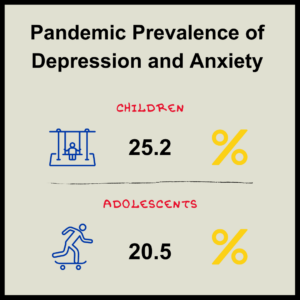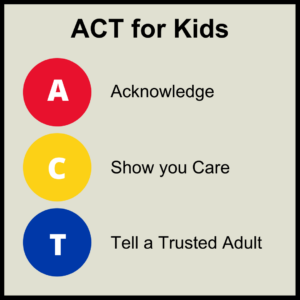Pandemic Intensifies Need for Suicide Prevention Curriculum
 Contributed by Mary Bonamer, Ph.D., L.P., Clinical Coordinator
Contributed by Mary Bonamer, Ph.D., L.P., Clinical Coordinator
True or False: Children and teens don’t actually suffer from depression. They are suffering with the emotional turmoil of growing up.
This statement is obviously false. This question, and others like it, are peppered throughout the parent portion of Positive Education Program’s new suicide prevention curriculum called Signs of Suicide.
By now, you’ve most likely heard how challenging the pandemic has been on children’s mental health. Of course, addressing serious mental health issues is not new at PEP, but the pandemic has intensified the challenges. And it’s not just kids at PEP. A meta-analysis published in August of 2021 in the Journal of the American Medical Association estimates depression and anxiety among children and adolescents globally were 25.2 percent and 20.5 percent, respectively. These numbers are double pre-pandemic estimates.[i]
As we at PEP witnessed the impact of the pandemic on kids’ mental health first-hand, we knew we needed to continue to make education about suicide prevention a part of PEP’s curriculum. After extensive research and a pilot program, we will be rolling out the new curriculum to all middle and high school students at our Day Treatment Centers in the next few months, where developmentally appropriate.[ii] Parents will receive a letter informing them of their child’s participation before the curriculum is introduced.
Next year, PEP also plans to implement a suicide prevention and resilience building program for younger students called Sources of Strength.
PEP’s New Suicide Prevention Curriculum for Students and Staff
The new Signs of Suicide Curriculum for adolescents is an evidence-based program that provides education and resources for students, educators, and parents. At PEP, all staff at Day Treatment Centers have now completed training in the suicide prevention curriculum. It uses the acronym “ACT” to help people know what to do if they’re concerned about suicide themselves or with someone they know. For students, the acronym stands for: Acknowledge. Show you Care. Tell a trusted adult.
For staff and parents, the acronym is the same; however, the “T” in ACT stands for “Tell clinical staff or a professional.”
The program emphasizes that thoughts of suicide are the result of an underlying illness, often depression. This notion is critical to understand because these illnesses can be treated.
Signs of Suicide Resources for Parents
The Signs of Suicide program provides robust resources for parents. It includes, for example, information to help parents spot warning signs of suicide, a parent screening tool to screen their adolescent for depression, and guidance for talking to an adolescent about suicide. It also includes a confidential, 24/7 help and resource line if help is needed.
“You can recognize depression because it’s a change in the teen’s normal behavior,” explains Valerie Dickerson Cordero of Families for Depression Awareness, in one of the Signs of Suicide videos for parents. “So, for a teen who used to enjoy certain activities, if that teen no longer enjoys those activities or decides to withdraw, that can be an indicator.”
Videos with tips like these and real-life stories and examples, help make the information easy to understand and accessible for parents. Other parent resources include:
- ACT for Parents Infographic
- ACT for Parents Handout
- Short videos to help identify and respond to youth depression and suicide.
National Resources
If you know someone who is showing suicide warning signs, help is available.
- National Suicide Prevention Lifeline: Call 1-800-237-TALK (8255)
- Crisis Text Line: Text “ACT” to 741741 for free 24/7 support
- SAMHSA (Substance Abuse and Mental Health Administration) National Helpline: 1-800-662-HELP (4357)
- SAMHSA Treatment Locator: http://findtreatment.samhsa.gov
If you have questions or want more information about PEP’s suicide prevention curriculum, contact Dr. Mary Bonamer, clinical coordinator via email or at 216-361-7760 ext. 104.
_____________
[i] Racine, Nicole; McArthur Brae Anne, Cooke, Jessica E., et. al. Global Prevalence of Depressive and Anxiety Symptoms in Children and Adolescents During COVID-19. Journal of the American Medical Association, Pediatrics. August 9, 2021.
[ii] Students at PEP Prentiss Autism Center and some at PEP Phoenix are not participating in this curriculum.


